Programme > Conférencier·e·s invité·e·s
|
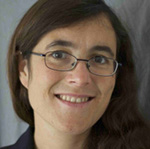
|
Anne-Laure Boulesteix obtained a diploma in engineering from the Ecole Centrale Paris, a diploma in mathematics from the University of Stuttgart (2001) and a PhD in statistics (2005) from the Ludwig Maximilian University (LMU) of Munich. After a postdoc phase in medical statistics, she joined the Medical School of the University of Munich as a junior professor (2009) and professor (2012). She is working at the interface between biostatistics, machine learning and medicine with a particular focus on metascience and evaluation of methods. She is a steering committee member of the STRATOS initiative and founding member of the LMU Open Science Center.
Title of the talk: A replication crisis in methodological computational research?
|
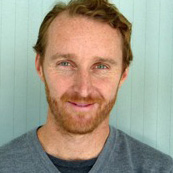 |
Guillaume Bourque is Professor at the Department of Human Genetics of McGill University in Montréal, Canada. He is also the Director of Bioinformatics at the McGill Genome Center and heads the Canadian Center for Computational Genomics (C3G). During his PhD (2002), he worked on genome rearrangements in evolution with Pavel Pevzner at the University of Southern California. After a postdoc with David Sankoff in Montréal, he worked at the Genome Institute of Singapore, from 2004 to 2010, where he was a Senior Group Leader and the Associate Director of Computational & Mathematical Biology. He joined the McGill university in 2010. His research interests are in comparative and functional genomics with a special emphasis on understanding the evolution of regulatory sequences in mammalian genomes, the role of transposable elements in gene regulation and the impact of genome rearrangements in evolution and cancer.
Title of the talk: Transposable elements are a source of innovation and variability in our response to infection
|
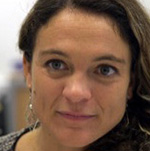 |
Hélène Morlon is a CNRS research director at the Institute of Biology of the Ecole Normale Supérieure. After obtaining her PhD in ecotoxicology in 2005 at the University of Bordeaux, she moved to the United States to do her postdoctoral research in the lab of Jessica Green, and worked with Joshua Plotkin at the University of Pennsylvania. Upon her return to France in 2010, she was recruited by the CNRS and continued her research at the Centre for Applied Mathematics of the École Polytechnique. There she obtained a grant from the French National Research Agency (ANR) for a Chair of Excellence and formed a team of young researchers. In June 2011, she became an associate member of the Centre interdisciplinaire de recherche en biologie of the Collège de France. In 2014, she joined the Institute of Biology at the ENS and was awarded a Consolidator Grant from the European Research Council. She was awarded the CNRS bronze medal in 2017 and the CNRS silver medal in 2021. She is broadly interested in understanding the ecological and evolutionary processes underlying current biodiversity patterns.
Title of the talk: Analyzing the evolution of the microbiome using metabarcoding data
|
 |
Cédric Notredame did his PhD in bioinformatics from 1994-to 1998 under the supervision of Des Higgins at the European Laboratory for Molecular Biology (EMBL) in Heidelberg and Cambridge (EMBL-EBI). It is during that time that he became increasingly interested in the development of sequence alignment algorithms. He then joined the CNRS in 2000 and in 2007, became senior principal investigator in the Bioinformatics and Genomics program of the centre for genomic regulation (CRG) in Barcelona (Spain) where he manages a team of ~10 researchers. His most notable scientific achievements to this day have been Nextflow, a pipeline language that makes it possible to run complex analysis in a portable and reproducible way (www.nextflow.io) and the T-Coffee multiple sequence alignment algorithm (www.tcoffee.org) that has received over 7,600 citations. He is also very interested in scientific dissemination and his main achievement on this front has been the book "Bioinformatics for Dummies" in 2002 and that has sold over 40,000 copies worldwide.
Title of the talk: Nextflow and NF-Core : growing your analysis with the right data sprinkler
|
|
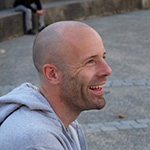
|
Pierre Peterlongo heads the "Genscale" research team at IRISA/Inria, the Computer Science laboratory of Rennes, studying algorithms for DNA sequencing data. He obtained his PhD in Computer Science in 2006 at University of Marne-la-Vallée and then did a Postdoc at IRISA in Rennes. During his PhD and postdoc, he worked on text algorithms applied to DNA sequences, for various problems of pattern matching, searching for approximate repeats and sequence alignments. He was then recruited as an Inria junior researcher in 2008 in Rennes. This coincided with the advent of high-throughput sequencing technologies, and his research interests moved towards the design of efficient data structures and algorithms able to scale the huge amounts of data generated by such technologies. He is notably recognized for his work and software for reference-free variant discovery, de novo comparative metagenomics and large-scale sequence indexing using k-mers.
Title of the talk: Swim in the data tsunami
|
|
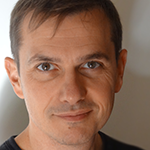
|
Raphael Guerois is group leader in bioinformatics and structural biology in the lab of Structural Biology and Radiobiology at the Institute for Integrative Biology of the Cell (I2BC) (CEA-CNRS-University Paris-Saclay campus). He obtained his PhD in biophysics in 1998 at University Paris 6 and moved to a postdoctoral position at EMBL Heidelberg in Germany, where he started developing predictive algorithms in the field of protein engineering and structural bioinformatics. Since 2007, his group is developing bioinformatics approaches for the prediction and design of protein interactions using evolutionary information with biological implications in the field of DNA repair and genome integrity.
Title of the talk: Exploring interactomes in 3D under the lens of coevolution
|
Tous les résumés (pdf)
|
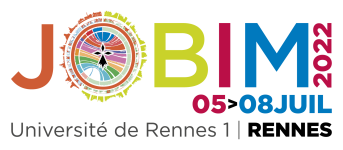

 Chargement...
Chargement...